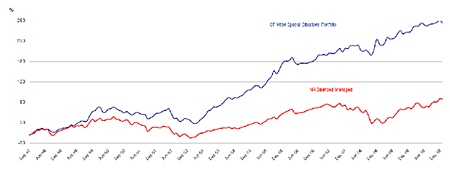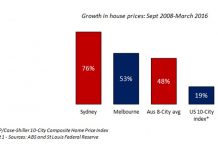As regular readers of this column know, we are big fans of MitonOptimal. Today we have a special report from Tim Price, director PFP Wealth Management, who interviewed Martin Gray recently.
On February 2, 2011, Martin Gray, manager of the CF Miton Special Situations Fund, spoke with Tim Price and Killian Connolly of PFP Wealth Management. Part 1 of the interview follows.
Tim Price: Is the financial crisis over?
Martin Gray: I’m still pretty cautious. I’ve positioned the portfolio fairly defensively as we’ve gone through this crisis, and I’m happy to stay reasonably defensive in my funds. In so far as the financial crisis is concerned, I think there’s more to come. I think we still have a solvency crisis, more so than just a banking crisis or a financial crisis. I’m happy to be reasonably defensive at the moment and see how things pan out.

Tim Price: What would cause you to be slightly more upbeat?
Martin Gray: One of the key things would be to see unemployment in mature economies to start decisively to come down. I’m not seeing or hearing any room for improvement yet in the UK, Japan, places like that. We’ve had very little real wage growth in the mature economies through the last 10 years, so I think that would be a key metric.
Tim Price: What’s the objective of your fund, particularly the CF Miton Special Situations Fund?
Martin Gray: Quite simply, it’s a global balanced fund. I look to make money in any areas; I don’t run to the benchmark; I’m looking to make money wherever I can. I don’t have any limits in terms of what I can hold, except perhaps in risk.
Killian Connolly: What investment products do you allocate towards in pursuit of the fund’s objective?
Martin Gray: I use a wide range of underlying assets: broadly speaking closed-end funds; open-ended funds; direct equities; direct bonds, like Gilts; ETFs [exchange-traded funds]; occasionally structured products. Direct equities would usually only be UK equities.
Killian Connolly: And derivatives? Is the fund exposed to any kind of esoteric products?
Martin Gray: Nothing particularly esoteric at all. The fund itself has no enhanced powers so I am restricted in that respect, but that’s how the fund has always been in its 13-year life, so why change it?
Tim Price: Can you say a little about the parent group?
Martin Gray: It’s been through quite a lot of change over the last couple of years and it’s now a purely asset management business, renamed at Group level MAM Funds. At the moment there’s just being completed a placing to clear the bank debt that was raised to buy the Midas group three years ago. There’s also three new directors coming on board, replacing a couple that are leaving the board now. It sounds like a lot of change but it’s very much to do with moving toward a pure asset management business. We’re looking forward to Gervais Williams [formerly with Gartmore] joining us in March – that’s very exciting for all staff.
Killian Connolly: Obviously you managed the fund during the Credit Crisis and during 2008 – what experience do you take from managing money during that time?
Martin Gray: It was very interesting times and 2008 was a year I enjoyed for the fund; it was a good year for the fund. We positioned ourselves probably much too early, in late 2006, for some problems in the asset markets and 2007 was quite hard work on the back of that, but 2008 was a very rewarding year for the fund where we did manage to make a positive return. I suppose since then I’ve continued to be a bit too defensive; going back to what I said earlier I’m not convinced that the banking crisis or the debt crisis is fully solved yet, and there are still some worries now. Added to the banking system we’ve got governments now heavily indebted and there are still plenty of danger signs going forward.
Tim Price: You’ve alluded to the government debt crisis. There seems to be an interesting polarisation in the market between Keynesian stimulus and more recently the so-called Austrian school has become popular with views about monetary policy and governments keeping out of the way rather than trying to reflate the economy. Do you have any economic bias from a philosophical perspective?
Martin Gray: Not especially. I just try and manage the fund as I see it and where I see opportunities taking into account everything that’s out there. Pursuing any particular style or any particular economic style is perhaps a bit too narrow for me. I have to try and make money through all times I guess, for investors, as well as trying to protect the downside as much as possible. I try not to be too focused on any one thing or any one area, even if it’s what I might basically believe in.
Killian Connolly: Do you support the ongoing coalition government’s austerity plans? Do you think that will create opportunities for the fund?
Martin Gray: I hope so. From a UK perspective I was very pleased with the austerity plan because it is tough and it gives them room to flex back a bit on it. The alternatives weren’t great for a standalone currency; if Sterling or the Gilt market had taken any kind of hit on the basis that we were getting out of control, I think that would have been a nightmare. You’d have seen yields climb quite sharply and we don’t want to be following what’s going on in Spain and Italy and southern Europe. I thought it was the right thing to do even though it’s pretty harsh.
Tim Price: You’ve mentioned Spain and Italy; what likelihood would you attach to any sovereign defaults in the Euro zone or elsewhere over coming years?
Martin Gray: This is down to the populace and whether they’re going to be prepared to take the harsh lessons of what they’re going to have to do. I mentioned earlier no real wage growth throughout most mature economies over the last decade or so – that hasn’t been true, of course, in southern Europe where they’ve enjoyed a huge kick-up in pay to the point where those economies are uncompetitive. That has to change. Have they got the stomach for reversing those 25% to 30% wage increases they’ve taken while the Germans have taken virtually none? Or are they going to be on the streets and forcing governments to default on their promises? It’s a very difficult one in terms of what will actually come out at the end of the day; are the Germans prepared to be the lender of last resort? I doubt that they are, despite Angela Merkel’s comments that she was pro-Euro and they will do all they could. I’m not sure they would go that far.
Tim Price: Do you have a view on the Euro then?
Martin Gray: I hold no Euro assets in the fund (or negligible amounts). Deliberately. There are risks for the Euro over the next few years. I’m quite happy not to hold Euro assets. That has had an effect on my asset allocation but I don’t see much point holding an asset if you don’t like the exchange rate of that economy versus Sterling.
To be continued…
The above data and research was compiled from sources believed to be reliable. However, neither MBMG International Ltd nor its officers can accept any liability for any errors or omissions in the above article nor bear any responsibility for any losses achieved as a result of any actions taken or not taken as a consequence of reading the above article. For more information please contact Graham Macdonald on [email protected]




